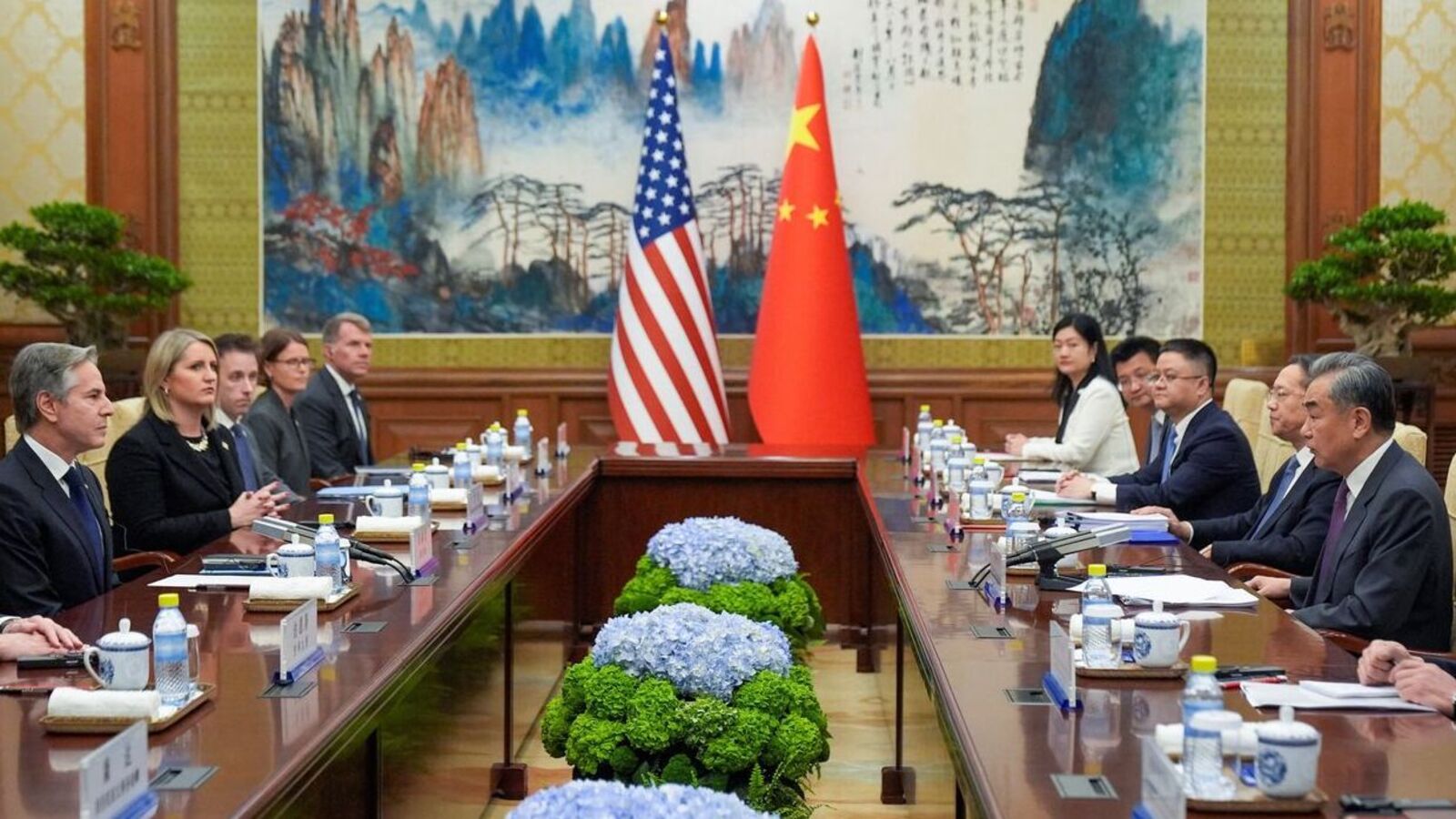Blinken meets with Xi as US pressures China to end support for Russia

The tone of Washington’s relations with Beijing has improved markedly since a Chinese balloon drifted over the U.S. in early 2023, prompting American allegations about Chinese espionage.
A November summit meeting in California between Xi and President Biden led to the resumption of bilateral military-to-military contacts, fresh efforts to curb the role that Chinese companies play in the global trade in fentanyl and discussions on the risks of artificial intelligence.
But as Blinken engaged in hours of meetings in Beijing on Friday with Xi and other top Chinese officials, there were an array of thorny security and economic issues, including China’s help in Russia’s push to revive its arms industry, China’s military posture in the South China Sea and differences over Taiwan.
U.S. officials say that China has provided Moscow with optics, microelectronics, drone engines and other materials that, while not lethal weaponry, have nonetheless strengthened Russia’s military industry at a critical stage in the conflict with Ukraine.
In 2023, 90% of Russia’s microelectronics imports, important for the production of missiles, tanks and aircraft, came from China, U.S. officials say. Beijing, U.S. officials add, has also helped Russia improve its satellite capabilities for use in the war in Ukraine.
Raising the stakes, Russian President Vladimir Putin said Thursday that he is planning to go to China in May. That visit will mark Putin’s first foreign trip since his re-election in March and underscores the priority that the Kremlin places on further expanding its security and economic ties with Beijing.
China has heeded Western calls not to provide arms to Russia, but a brisk trade between the two neighbors in so-called dual-use goods, which have military and nonmilitary applications, has boosted Moscow’s efforts to rebuild its military industry, which has been constrained by Western sanctions.
President Biden complained about dual-use exports in a call with Xi earlier this month. U.S. officials, meanwhile, have encouraged European nations, which have extensive trade ties with China, to press Beijing on the matter as well.
The Wall Street Journal reported this week that U.S. officials were drafting sanctions that would cut off some Chinese banks from the global financial system if Beijing rebuffed its demands.
Chinese officials have repeatedly complained that the U.S. is seeking to hamper its economic development by limiting its access to advanced chips and going after some of its leading technology companies, such as TikTok owner Bytedance, while selling weapons to Taiwan.
“Overall, the China-U.S. relationship is beginning to stabilize,” Chinese Foreign Minister Wang Yi said at the start of his meeting Friday with Blinken. “But at the same time, the negative factors in the relationship are still increasing and building…China’s legitimate development rights have been unreasonably suppressed and our core interests are facing challenges.”
Ukraine isn’t the only instance in which the U.S. has accused China of protecting Moscow’s interests. Earlier this week, the U.S. and Japan put forward a United Nations Security Council resolution to try to head off the deployment of a nuclear-armed antisatellite weapon that U.S. officials have accused Russia of developing. That measure reaffirmed the 1967 Outer Space Treaty, which bans putting weapons of mass destruction in orbit.
The U.S. criticized China for abstaining on the resolution, which Russia vetoed.
“Despite our multiple attempts to forge consensus, China has shown that it would rather defend Russia as its junior partner,” Linda Thomas-Greenfield, the U.S. ambassador to the U.N., said Wednesday.
One area in which incremental progress was expected is counternarcotics. Curbing the global trade in fentanyl, which is the leading cause of death for Americans between the ages of 18 and 49, is a high priority for Biden during this presidential election year.
In the months since Xi and Biden met in California and agreed to restart joint efforts to combat the drug trade, the two countries have convened a series of high-level meetings on the matter, including exploring ways to coordinate law enforcement activities.
“We appreciate the work that’s been done in the time since then to build that cooperation,” Blinken told China’s Minister of Public Security Wang Xiaohong during a separate meeting on Friday. “There is more that needs to be done to have a sustained impact.”
The biggest sticking point is the role of Chinese companies in the production of chemicals used to make fentanyl and other drugs. For years, such chemicals, known as precursors, have been openly sold over the internet, creating a marketplace for drug cartels to connect with their suppliers.
China has been slow to impose limits on such chemicals, a source of frustration for U.S. officials. In March 2022, for example, the U.N. Commission on Narcotic Drugs added three such precursors to a list of internationally scheduled chemicals. Member states were then required to implement corresponding rules at the national level.
Two years later, China still hasn’t scheduled the chemicals. China said last year it was “in the process” of scheduling three new precursors, but hasn’t said when it would be finished.
Write to Michael R. Gordon at [email protected] and Brian Spegele at [email protected]
